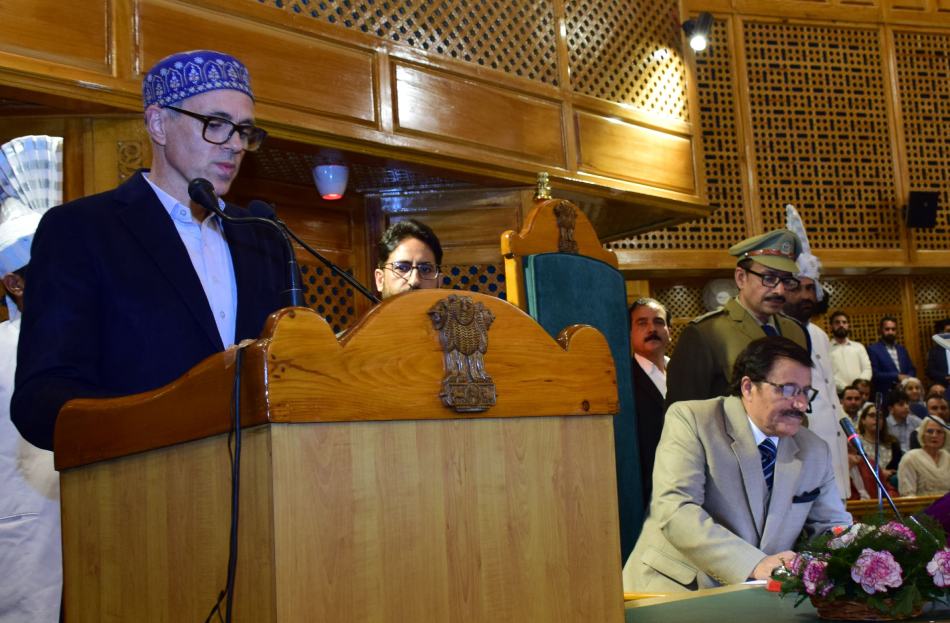


In a media interaction, Jammu and Kashmir Chief Minister Omar Abdullah expressed his disapproval of the hybrid model of governance in the Union Territory, stating that dual centres of power are not effective tools for governance. He also addressed other issues, such as differences of opinion and reservation protests, reiterating the need for a single centre of command for better functioning of the system. The chief minister also discussed the recent controversy over land acquisition for a campus of the National Institute of Technology, emphasizing the importance of finding a balance between development and protecting productive agriculture land.
Omar Abdullah Criticizes Hybrid Governance Model in Jammu and Kashmir
Background:
In August 2019, the Indian government revoked Article 370 and Article 35A of the Constitution, which granted special status to the state of Jammu and Kashmir (J&K). The state was subsequently reorganized into two Union Territories: Jammu and Kashmir (with a legislature) and Ladakh (without a legislature).
The hybrid governance model in Jammu and Kashmir involves a Lieutenant Governor (LG) appointed by the central government, who is assisted by a Council of Ministers led by a Chief Minister. The LG has overriding powers over the Chief Minister and his cabinet.
Omar Abdullah's Statement:
In a recent media interaction, former Jammu and Kashmir Chief Minister Omar Abdullah expressed his disapproval of the hybrid governance model. He argued that dual centres of power, with the LG and the Chief Minister, were not effective for governance. He stressed the need for a single centre of command to ensure better functioning of the system.
Abdullah said, "You have two centres of power, and both of them are sending signals in different directions. That is not effective governance." He added, "If you want effective governance, you need a single centre of command."
Other Issues Addressed:
Besides the governance model, Omar Abdullah also addressed other issues during the media interaction.
FAQs:
1. What is the hybrid governance model in Jammu and Kashmir? Answer: The hybrid governance model involves a Lieutenant Governor (LG) appointed by the central government, who is assisted by a Council of Ministers led by a Chief Minister. The LG has overriding powers over the Chief Minister and his cabinet.
2. Why does Omar Abdullah criticize the hybrid model? Answer: Abdullah argues that dual centres of power, with the LG and the Chief Minister, are not effective for governance. He believes that a single centre of command is necessary for better functioning of the system.
3. What are Abdullah's views on differences of opinion? Answer: Abdullah acknowledges that there are differences of opinion within the National Conference party, but emphasizes that the party will remain united.
4. What is Abdullah's stance on the NIT campus land acquisition? Answer: Abdullah believes that there needs to be a balance between development and protecting productive agricultural land. He supports finding a solution that does not compromise either goal.
5. What are the main issues currently facing Jammu and Kashmir? Answer: The main issues include the implementation of the new governance model, addressing the concerns of various communities, and promoting economic development while protecting the environment.

In a strongly worded statement, politician Shashi Tharoor expressed his opposition to the VB-G RAM G Bill that aims to replace MNREGA. Tharoor argued that the removal of Mahatma Gandhi's name from the scheme goes against its core values and also criticized other proposed changes such as financial alterations and a shift of responsibility to states. The politician believes that the Bill poses a threat to the principles of federalism and that the scheme should not be made subject to executive notification.

Union Minister Shivraj Singh Chouhan introduced the Viksit Bharat - Guarantee for Rozgar and Ajeevika Mission (Gramin): VB-G RAM G Bill, 2025 in the Lok Sabha. The bill aims to establish a new rural development framework aligned with the national vision of Viksit Bharat @2047 and seeks to provide a statutory guarantee of 125 days of wage employment to each rural household. The government is determined to pass the bill in this parliamentary session and failure to do so could complicate budgetary provisions.

In a significant move to improve academic standards, India's new Viksit Bharat Adhishthan Bill, 2025, places student feedback at the heart of higher education accreditation. Union Education Minister Dharmendra Pradhan, citing the National Education Policy 2020, announced that for the first time, students will have a direct impact on accreditation outcomes. The new framework will also increase institutional autonomy and encourage innovation, but with a strong emphasis on accountability through transparent student-led evaluations. The consolidation of regulators and accreditation bodies aims to streamline and strengthen the quality of higher education in India.

On the occasion of Vijay Diwas, a day commemorating India's 1971 victory over Pakistan, Rahul Gandhi, Leader of Opposition in Lok Sabha, paid his respects to the brave soldiers who showed indomitable courage, leading to the liberation of East Pakistan and the formation of Bangladesh. The date also marks the surrender of 93,000 Pakistani soldiers to the Indian Armed Forces and is a tribute to the bravery and sacrifice of Indian soldiers. Congress National President Mallikarjun Kharge also highlighted the 1971 victory as a great example of humanity and justice under the leadership of then Prime Minister Indira Gandhi.

Senior Congress leaders respond to Delhi court's refusal to take ED's chargesheet in the National Herald-Young Indian case, emphasizing the lack of evidence and foundation of the case. They accuse the BJP of exaggeration and targeting the opposition, claiming that the ruling has validated their long-held belief that the case is politically motivated. Congress leader Abhishek Manu Singhvi highlights the legality and commonality of corporate restructuring, while Congress general secretary K.C. Venugopal condemns the Modi government's targeting of Sonia Gandhi and Rahul Gandhi without any legal basis.

The Congress party declared a moral and legal triumph after the Delhi court dismissed the Enforcement Directorate's chargesheet in the National Herald-Young Indian case. The judge noted that the chargesheet was based on a private complaint rather than an FIR, making it legally inadmissible. The Congress accused the Modi government of maliciously targeting its leaders and misusing central agencies for political gain. They vowed to continue fighting for truth and democratic rights, asserting that nothing could deter them from their mission.

India commemorates Vijay Diwas every year on December 16 to honour the soldiers who sacrificed their lives during the 1971 war with Pakistan, which resulted in the creation of Bangladesh. As part of this year's celebrations, the Indian Army displayed a reconstructed Turkish armed drone, Yiiha, which was shot down by India during Operation Sindoor on May 10. The Kamikaze class of drones, also known as "suicide drones," were used by Pakistan to target Indian military and civilian installations, but were almost all destroyed by the Indian military.

India celebrates the 54th Vijay Diwas, honoring the bravery and sacrifice of its soldiers in the 1971 war that led to the liberation of Bangladesh. Political leaders, including Prime Minister Narendra Modi and President Droupadi Murmu, pay glowing tributes to the armed forces and their unmatched courage. The Army marks the occasion by recalling the historic triumph and the flawless coordination between different branches of the military, with an impressive Military Tattoo in Kolkata.

Renowned spiritual leader and former BJP MP, Ram Vilas Vedanti, passed away at the age of 67 due to a heart attack. Known for his significant role in the Ram Janmabhoomi movement, Vedanti had been admitted to a hospital in Rewa for a blood infection and low blood pressure. Attempts to transport him to a better medical facility were unsuccessful due to bad weather. Political leaders, including Uttar Pradesh Chief Minister Yogi Adityanath, expressed their condolences and praised Vedanti's contributions to society.

Indian Ambassador to the United Nations, Harish P, slammed Pakistan for misusing international platforms for its hostile agenda against India at the UNSC Open Debate on “Leadership for Peace”. He objected to Pakistan’s reference to Jammu and Kashmir and questioned its democratic credentials while reaffirming India’s stance on cross-border terrorism. This reflects the ongoing strain in India-Pakistan relations and New Delhi’s determination to counter any attempt by Islamabad to internationalise bilateral disputes.